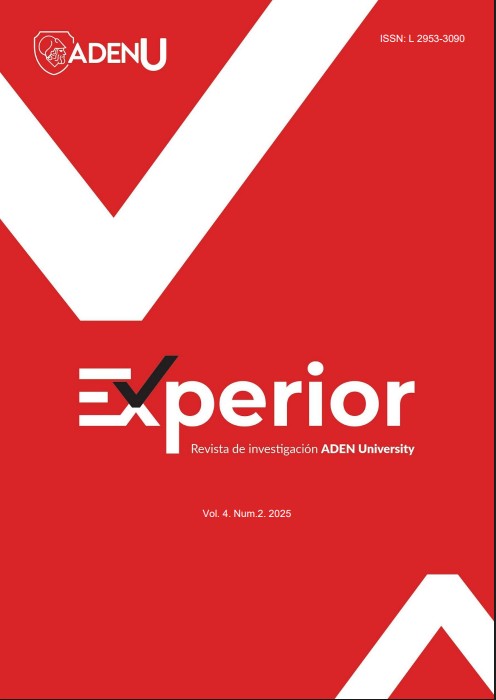Employer branding in the context of attracting human talent and marketing strategies
DOI:
https://doi.org/10.56880/experior42.1Keywords:
talent attraction, organizational commitment, corporate image management, employer brand, talent retentionAbstract
In order to identify the relationship between employer brand perception and organizational commitment, a quantitative and correlational study was conducted, analyzing the opinions of marketing and human resources students from the Marketing School of the San Miguelito Regional University Center. The selected sample was 70 students, using a non-probabilistic convenience sampling, on the importance of the employer brand in attracting talent and its relationship with marketing strategies. Results show a positive correlation between the favorable perception of the employer brand and greater employee commitment, showing the need for organizations to strategically manage their image to strengthen the recruitment and loyalty of their human capital. Obstacles in the implementation of the employer brand were also identified, and future research is suggested that consider sociodemographic variables to expand the results of the analysis regarding this topic.
Downloads
References
Aguado, D., Rico, R., Rubio, V. J., & Fernández, L. (2016). Applicant reactions to social network web use in personnel selection and assessment. Revista de Psicología del Trabajo y de las Organizaciones, 32(3), 183-190. https://doi.org/10.1016/j.rpto.2016.09.001
Backhaus, K., & Tikoo, S. (2004). Conceptualizing and researching employer branding. Career Development International, 9(5), 501-517. https://doi.org/10.1108/13620430410550754
Barrow, S., & Mosley, R. (2005). The employer brand: Bringing the best of brand management to people at work. John Wiley & Sons. https://doi.org/10.1177/097215091101200215
Bartolini Castro, L. (2021). Cómo implementar el concepto de marca empleadora en las Pymes. [Trabajo de Grado]. Universidad Siglo 21.
Baum, M., & Kabst, R. (2014). The effectiveness of recruitment advertisements and recruitment websites Indirect and interactive effects on applicant attraction. Human Resource Management, 53(3), 353-378. https://doi.org/10.1002/hrm.21571
Blasco-López, M. F., Rodríguez-Tarodo, A., & Fernández-Lores, S. (2014). Employer branding: estudio multinacional sobre la construcción de la marca del empleador. Universia Business Review, (44), 34-53. https://www.redalyc.org/pdf/433/43332746002.pdf
Cable, D.M. & Turban, D.B. (2001), Establishing the dimensions, sources and value of job seekers' employer knowledge during recruitment. Research in Personnel and Human Resources Management (Research in Personnel and Human Resources Management, 20), Emerald Group Publishing Limited, Leeds, 115-163. https://doi.org/10.1016/S0742-7301(01)20002-4
Collins, C. J., & Stevens, C. K. (2002). The relationship between early recruitment-related activities and the application decisions of new labor-market entrants A brand equity approach to recruitment. Journal of Applied Psychology, 87(6), 1121-1133. https://psycnet.apa.org/doi/10.1037/0021-9010.87.6.1121
Deloitte. (2019). Global Human Capital Trends Report. https://goo.su/XzaHru
Edwards, M. R. (2010). An integrative review of employer branding and OB theory. Personnel Review, 39(1), 5-23. https://doi.org/10.1108/00483481011012809
Gabrielova, K., & Buchko, A. A. (2021). Here comes Generation Z: Millennials as managers. Business horizons, 64(4), 489-499. https://doi.org/10.1016/j.bushor.2021.02.013 corregido
Gavilan, D., Avelló, M. & Fernández Lores, S. (2013). Employer branding: la experiencia de la marca empleadora y su efecto sobre el compromiso afectivo. aDResearch ESIC International Journal of Communication Research. 7, 7, 58–75. https://doi.org/10.7263/adresic-007-04.
George, W. R. (2015). Internal Marketing for Retailers: The Junior Executive Employee. In: Lindquist, J.D. (eds) Proceedings of the 1984 Academy of Marketing Science (AMS) Annual Conference. Developments in Marketing Science: Proceedings of the Academy of Marketing Science. Springer, Cham. https://doi.org/10.1007/978-3-319-16973-6_68
Hernández, M. A. (2016). Marketing, Recursos Humanos y marca empleadora. MK: Marketing+ ventas, (309), 22-33. https://goo.su/I2ZetZ
Huovinen, I. (2025). Developing a brand guideline to support employees personal branding. [Bachelor’s Programme in Business Administration]. Lappeenranta–Lahti University of Technology LUT.
Hurtado Palomino, A., De la Gala Velásquez, D., Ramon, B., Quintana, C., de Meliza, F., & Quispe Ambrocio, A. D. (2021). Cultura y compromiso organizacional: Efectos indirectos de la experiencia de marca empleadora. Revista Universidad y Sociedad, 13(4), 369-377. http://scielo.sld.cu/scielo.php?pid=S2218-36202021000400369&script=sci_arttext&tlng=en
Jiménez, A. (2015). Employer Branding: 14 preguntas y una conclusión. Capital humano, 302, 84-91. https://goo.su/d0eXke
Keller, K. L. (2001). Building customer-based brand equity a blueprint for creating strong brands. Marketing Science Institute. https://goo.su/7p8xII
Parment, A. (2009) Sustainable Employer Branding. Liber.
Peña Chinchay, K. J. (2023). La marca empleadora y el compromiso organizacional de los docentes del colegio Elite School Huacho, primer semestre académico 2022. [Tesis de Licenciatura]. Universidad Nacional José Faustino Sánchez Carrión.
Ramos Cortijo, A. (2021). Relación entre la percepción de la marca empleadora y el compromiso organizacional. [Tesis de Licenciatura]. Universidad de Lima.
Tanwar, K., & Prasad, A. (2016). Exploring the relationship between employer branding and employee retention. Global business review, 17(3_suppl), 186S-206S. https://doi.org/10.1177/0972150916631214
Downloads
Published
Issue
Section
License

This work is licensed under a Creative Commons Attribution-NonCommercial 4.0 International License.










